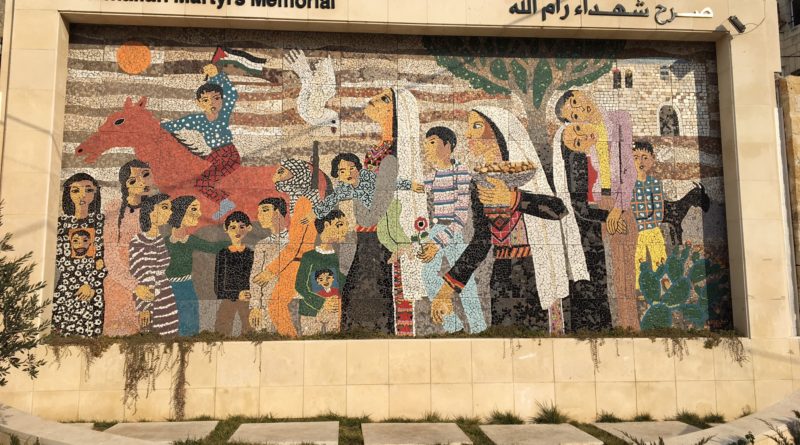A Day in Ramallah by Jack Ruzicho
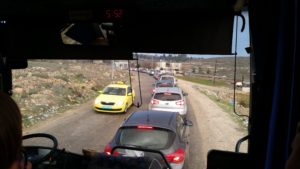 On my third trip to Israel/Palestine this past winter, with the Keep Hope Alive (KHA) Program planting and picking olive trees for Palestinian farmers, our group spent a day in the city of Ramallah. This city is the de facto capital of Palestine because most Palestinians in the West Bank are not allowed into Jerusalem, which is their spiritual and historic capital. Although it is considered an interim solution as their capital, for us, it was the most exciting and fascinating city on our tour.
On my third trip to Israel/Palestine this past winter, with the Keep Hope Alive (KHA) Program planting and picking olive trees for Palestinian farmers, our group spent a day in the city of Ramallah. This city is the de facto capital of Palestine because most Palestinians in the West Bank are not allowed into Jerusalem, which is their spiritual and historic capital. Although it is considered an interim solution as their capital, for us, it was the most exciting and fascinating city on our tour.
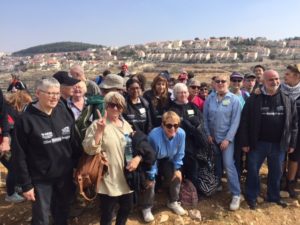
Not being harvest season, our trip was a tree planting one. Our tree planting team of approximately 45 from Europe, Canada and the U.S. spent several days in the fields, but on this day, we spent a couple of hours intermingling with the local Palestinians in shops and restaurants and taking in the city sights on Ramallah’s very busy main street. Women throughout Palestine generally dress formally in public and the younger women were in hijabs, fitted slacks, dress shoes and colorful blouses. The downtown was teeming with shoppers; the sidewalks were crowded and we sometimes had to walk in the street.
Moving along, we felt part of the crowd as if we belonged. Some Palestinians recognized us as Americans and Europeans and asked us why we were there. After we told them we were there to help plant olive trees for their farmers, hand shakes, smiles and hugs came aplenty.
One Canadian-Palestinian was visiting his parents who live in Ramallah. He said his family relies on their olive trees to supplement their income, and he was there to help them plant trees. I told him about our KHA program which he immediately googled. Finding Keep Hope Alive on his phone, he said that he may apply and come with the KHA group next year. I thought, hey, maybe a new recruit, right from the streets of Palestine! Word started to spread in the street about who we were and why we were there. Soon, we had several Palestinians coming to us to shake our hands and say “Thank you”. It was a very good feeling I’ll not soon forget.
Later we visited the PLO Headquarters in Ramallah, where Yasser Arafat held meetings when the PLO (Palestine Liberation Organization) was established in 1964. Arafat was Chairman of the PLO and later became the first president of the Palestinian Authority. The PLO was originally considered a terrorist organization by the U.S. and Israel because their stated goal was liberation of Palestine, even through armed struggle. But after the Madrid Conference in 1991, and after recognizing Israel’s “right to exist” in 1993, and rejecting violence, they were recognized at the UN as the official representatives of the Palestinian people.
The 1993-94 Oslo Accord was to have implemented self-rule, but we saw that 25 years on, self-rule has not materialized and Oslo has disappointed Palestinians on many levels. Today, Mahmoud Abbas is the president of the PLC, the legislative body that governs Palestine, but he is not popular with all Palestinians. Many see him as doing the bidding and policing for Israeli authorities and keeping the Oslo charade going.[1]
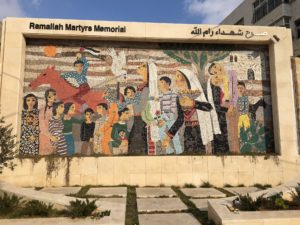
Our group sat in the PLO chairman’s conference room for a presentation by Xavier Abu Eid, Communications Advisor of the PLO. He explained that the United Nations upgraded Palestine in 2012 to a “non-member observer status”, equal to the status of The Holy See, The Vatican. He stated that a “two state solution” must include both the West Bank and Gaza. He acknowledged that Hamas has played a negative role throughout their history, but said they are part of the social fabric of Palestine, and any real solution must involve them. He admitted that a “two state solution” may be difficult to attain now due to the many settlements in the West Bank and Israel’s thinking that Jerusalem is exclusive to them.
But Mr. Abu Eid suggested a two state solution could involve retaining the 1967 border and a land swap discussion, which would include exchanges of territory, not population because Palestinians need access to their resources in their territory. He alluded to a possible “one state solution” of sharing all the land with all the people. This would be a kind of federation that would see equal rights for all people living there. But such a state would only be possible, he said, if the settlement project and the apartheid laws and practices are legally terminated. He told us, however, that Israel and Palestine have not been able to agree on an agenda to start earnest negotiations. And Gaza, he said, with all its collapsing infrastructure, may not be livable in three years.
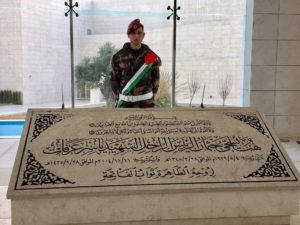
That afternoon, we visited the Arafat Tomb. There were three honor guards with AK-47 type weapons protecting the tomb and museum complex. Myself and others witnessed the weapons in the guard shack with no one guarding them. Our tour guide told me later that the guards have no ammunition for the guns; they are just for show. Under Israel’s military occupation, if the Israeli forces appear in Ramallah searching for someone, there is a warning system given to the city police force (including the honor guards) to disappear from sight, otherwise they could be in grave danger if seen with a weapon, even if they are just for show. They are an occupied people, after all, and they don’t actually control very much.
Leaving Ramallah on our tour bus, we returned to the Bethlehem area late in the day. There are two kinds of roads in the West Bank: the brand new gleaming roads built by Israel to serve the Jewish settlers, and the older pre-occupation and pre-WWII British Mandate era roads, which are the ones Palestinians are mostly relegated to. On occasion, some West Bank Palestinians are permitted to use the settlers’ roads if they obtain a permit from the Israeli government, but those are rarely given. There is true segregation in Israel/Palestine and with all the separation built into the system, a Jewish settler never has to come across a Palestinian in his daily life when he comes and goes to work in Israel proper. This is why many Israelis don’t even know where Israel ends and the West Bank begins.
Our bus had to pass a checkpoint to enter the Israeli highway system. After waiting in line for about 40 minutes to reach the checkpoint, the Israeli military told our guides that we were not permitted to enter the highway. This did not go down well and our guides became extremely upset with the soldiers, saying “But we have Americans on board the bus.” Then they spoke in Arabic, venting their frustration. In the end, after all the waiting and negotiating, we were denied permission to enter the highway, and were required to take the much longer route back to our hotel. The reason: our driver was a Palestinian. More likely, it was because the Israeli military knew what group we were and what we were there for: to keep hope alive!
In February 2017, Rev. Dr. Jeff DeYoe, pastor of Covenant Presbyterian Church in Fort Myers, Florida, led a group on a Keep Hope Alive (KHA) trip to Israel/Palestine. The KHA trips are part of the East Jerusalem YMCA/YMVCA Joint Advocacy Initiative providing an international presence as solidarity and witness for the Palestinian olive harvest in the fall, and for olive tree planting in winter. This was Rev. DeYoe’s 5th trip to the region. The articles appearing this week are reports from the ground by “people in the pews” who went with him and stood as witness. Each traveler approached the trip from a different place in their faith and life journey. Through these posts edited by Noushin Framke, Ecclesio is pleased to take you to the olive groves in Palestine through their varied lenses.
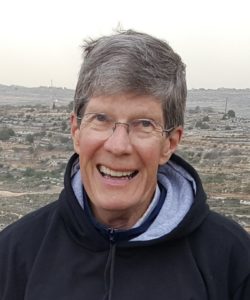
Jack Ruzicho is a retired civil rights lawyer who practiced for 46 years with the Civil Rights Division, Ohio Attorney General’s Office, and in private practice. He is married to Laura and lives in North Fort Myers, Florida where he is a member of the Covenant Presbyterian Church.
[1] In a recent speech before the National Press Club in Washington D.C. on March 17, 2017, Dr. Ilan Pappe, noted Jewish historian and author of The Ethnic Cleansing of Palestine (2006), pleaded for new leadership in Palestine to address the illegal occupation. He sees the last fifty years of “the peace process” as a waste of time and energy because we assumed good faith negotiations. He concluded, “We need a different Palestinian thinking. We need a united authentic representation of the Palestinian people, which we don’t have today, that should give us the lead. We will have to get rid, eventually, of the existing political structures in Palestine in order to be able to lead us, settlers and natives together, into a future that has normal life in it, as you and other people in the world enjoy.”

